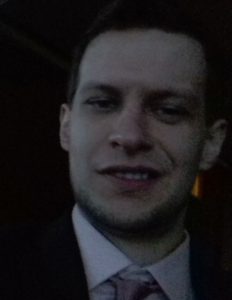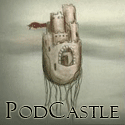EP589: Seb Dreams of Reincarnation
AUTHOR: Aimee Ogden
NARRATOR: Matthew Hamblin
HOST: Mur Lafferty
- Seb Dreams of Reincarnation is an Escape Pod original.
- Discuss on our forums.
- For a list of all Escape Pod stories, authors and narrators, visit our Wikia
- Thank you for visiting us on Facebook and Twitter
Thanks to our sponsor, ARCHIVOS – a Story Mapping and Development Tool for writers, gamers, and storytellers of all kinds!
about the author…
about the narrator…
Matthew is a writer and videographer from Leeds, England. He has a penchant for good stories and a loose grasp of apostrophes. He owns a very cute dog, named Bruce.
By Aimee Ogden
They unplugged Seb’s neurodes at the end of his ten-year tour of duty. He’d known it was coming, had been told before he ever signed the contract that if they left him in any longer his health would start to deteriorate. What they hadn’t mentioned was that his health would deteriorate anyway. Once, Seb had kept six hundred people alive, responded instantly to their needs, and their wishes too when those fell within his power. He had carried them all in his belly, made them part of himself. He thought he would implode under the emptiness of having lost them.
Today, though, his only job was to leave his apartment: something he hadn’t done since the first week he’d moved in. He had groceries delivered, the occasional takeout, odds and ends as he needed them. Supermarkets and corner stores might as well have been on another planet. If they were, he might have actually cared to visit them. He stared out his ninth-floor window while trying to summon up a reason to go out, let alone the will to do so. His fleet-assigned shrink had given him the task and called it homework. Which was of course the exact opposite of what it actually was. Out-of-home work.
He paced the length of the living room a few times, until the 3D printer on his telemedicine kiosk chirped: his painkillers had printed. He dry-swallowed his pain pills and walked to the apartment door before he could think twice. No one else was in the ninth-floor elevator lobby, and Seb jabbed his finger into the interface to call for a ride to the ground floor. Once the door opened, he realized he should have put on a jacket. Too late–the two women already in the car stared at him as he hesitated. He ducked his head and took a place in the elevator’s front corner, as far from them as possible. Not a peep from either women as the elevator dropped groundward, but their eyes burned on the neurode stumps that stood out at the base of his skull and the back of his neck. He imagined he could feel the photons pinging off him and into their greedy retinas, and tried not to laugh. Phantom photons to go with his phantom limbs. He should have gone back for a jacket. One with a high collar, and thick padding to hide the swells of the additional stumps that traced the contour of his spine.
When he made it out of the downstairs lobby, evening shaded the street outside. Gaudy displays advertised burgers, sushi, movies, liquor. Seb’s head swung back and forth, trying to force a familiar constellation to appear from the pattern. He should have planned a route before departure. Burgers, then. That was closest.
Tires screeched as he stepped out into the street. Three cars abreast, one for each lane, came to a stop. Each of them maintained the same precise ten-foot stopping distance. Behind them, more traffic began to pile up. A woman in the middle car set aside her laptop and rolled down her driver’s side window. “This isn’t a crosswalk,” she yelled. “Are you impaired or something?” Seb fled to the far side of the street and crashed through the doors into the restaurant he’d chosen.
The boy behind the counter at the burger restaurant stared at Seb. “Welcome to Marilu’s,” he said finally. “Can I–”
“Burger.” Seb realized too late that he was interrupting. So slow, waiting for the clerk to invite him to order. Much faster, much better, to just shoot the data to a waiting computer that would have already started up the grill. “Fries. Chocolate malt.”
The boy’s eyes grew, and he prodded frantically at the interface on the counter in front of him. “Uh … cheese on that burger?”
Seb held out his handset to pay.
The boy tried again. “Was that a small or large fries? And the shake?”
Again Seb shook his handset in the direction of the interface. The boy pressed a few more keys, and Seb’s handset vibrated against his fingers to let him know the payment had been processed. “That’ll be right up,” the boy said, and rushed off. Seb retreated to a bench by the door to wait.
A man and his young daughter stood opposite him, in the corner between the door and the counter. Waiting for their own order, maybe, or for someone to come out of the bathroom. The man studiously watched the diners in the half-empty restaurant, but the girl’s eyes hung on Seb. She had violet irises–a favorite mod before Seb had left Earth, and still lingering around, apparently–and she was chewing wetly on the tips of her mittens. He wished she would stop that.
But when she finally did let go of the mitten, it was to pester him with a question, and an altogether too familiar one at that. “Did it hurt?” she asked. A tiny piece of blue fuzz clung to her upper lip. “When they put those neurodes in you?”
He didn’t correct her juvenile pronunciation–noo-rodez–and he didn’t answer her question either. “It hurts now,” he said, and the girl’s father bent down and whispered something in her ear. She didn’t ask anything else, but she kept on staring at him while she masticated the blue yarn of her mittens. Seb thought about leaving without his food. He wondered what his doctor would say about that, if he told her about tonight’s adventure at all. But finally another man appeared, and the trio stepped out hand-in-hand into the evening.
Only another minute until the teenager behind the counter reappeared with a folded paper bag and a dew-beaded cup. “Here’s your order.” But he didn’t set the food down on the counter or hold it out when Seb approached. “My sister is an ore transport,” he said, and his voice cracked. “She’s got eight years left in her term. Do you think she–”
“I don’t know your sister.” Seb didn’t want to hear the end of the boy’s question. He reached out and snatched the bag out of the boy’s hand. His crude clumsy fingers slipped on the wet cup, and it crashed to the floor. Gobs of chocolate ice cream spattered the tiles, the counter, Seb’s shoes. Seb left it there, left the gaping boy, and fled to the comforting, oppressive walls of his apartment.
#
None of it was the fleet’s fault, not really. They gave him an apartment and a pension that would let him live comfortably for the rest of his life. They set up the telemedicine kiosk on the kitchen counter, between the electric kettle and the wall. They even scheduled the consults for him–the pension was conditional on his keeping those appointments, in fact. An ex-neurode had offed herself a few years back, not long after the program had launched, and now they kept close tabs on their alumni. Suicide was bad for recruitment, though that first death hadn’t kept Seb from signing on.
He wished he had a telemed consult with his psychologist today, and at the same time he was glad he didn’t. He sat in the darkness for a while and listened to the great nothingness all around him. Downstairs, a baby was crying, was always and forever crying, and there were raised voices somewhere down the hall too. He’d thought that the extra noise would help with the–what did his doctor call it? “The readjustment”–but instead it set his teeth on edge. It was just a reminder that there should have been so much more.
He hadn’t finished the hamburger, but the grease still lingered unpleasantly on his tongue. He went to the bathroom and took out his toothbrush. No mirror over the bathroom sink–none anywhere in the apartment, in fact. It was the only instance of redecoration he’d undertaken. Each time he glanced in a mirror, he expected to see the great curving hull of a starship arcing away behind his back, and each time that absence tore him open like a speeding microasteroid fragment.
#
Seb stayed up too late at night. Returning to the habit of sleep had been a challenge; ten years of sleep diversion tech had put his former life’s seven-hours-a-night routine out of reach. It wasn’t as if a starship could settle down for a few minutes’ rest, not with all the lives depending on it. So the years and years of stim had taken their toll on the old physiology, too. Seb settled for a few hours each night, in fits and snatches. Just long enough to cycle through a set of dreams. A biological necessity, like a bowel movement; a means of dispelling mental waste rather than physical.
And there was so much waste to dispense with. Dreams of navigation maps and split-second course corrections. Dreams of power fluctuations and crew management. Dreams of Saturn’s rings, shattering sunlight a thousand different ways. Dreams of the bustling hive inside of him, back when he was much more than a single ticking heart, a pair of wet fluttering lungs.
Seb dreamed of reincarnation.
#
He preserved the hamburger wrapper to show the psychologist during their next talk. An absurd little badge of honor, but she praised his progress–he left out the staring little girl and the final encounter with the anxious clerk. “I’m proud of you,” she told him from the telemed kiosk’s glossy screen. Seb couldn’t remember her name; he only ever called her doctor and if she’d noticed, she’d never mentioned it. “I imagine that wasn’t easy to do?”
“I guess not.” He managed not to glance at the time displayed in the top center of the screen.
She shifted to a different navigational bearing. “Have you given any more thought to a new hobby, like we talked about? A way you can spend your time, Sebastian?”
She always called him that, never Seb. Seb he preferred; Seb clipped short and simple off the tongue, not dragging through unnecessary syllables: Seh-bass-tyin. “A little. Lots of new music since before I left. Books to read.”
She gave him a moment, but he had run out of acceleration. “Have you downloaded anything? Ordered a musical instrument? Or a paper book?” She shifted her weight, re-crossed her legs. “If you like analog books you could even try antiquing. I’m sure there are some fine places in the city to shop for vintage copies.”
“That’s an idea.” Seb couldn’t bring himself to call it a good idea, and he didn’t want to call it a bad one to the doctor’s face. Along his back, his neurodes throbbed in white-hot longing, calling out for his missing self. He bobbed his head in a nod.
“Good,” said the doctor. “Give it some thought, come up with an idea or two. Then we can discuss concrete steps next time. Make a plan.”
“All right. Good. Thank you.” Seb didn’t much care for hobbies, but he liked plans.
Before she signed off, the doctor directed the kiosk to dispense his medications. Two different painkillers and an antidepressant–exactly one of each type of pill. The 3D printer in the kiosk chirped when it was finished. More doses would print at dinnertime and before Seb went to bed. Once, he’d set up a bypass circuit in the printer, one that would print out duplicate doses of the pain meds every time the doctor sent an order. He’d been an engineer once, before any of this, an engineer and a self-professed technophile. He’d wanted to sail between the stars, to experience life as something greater than himself. Now the thought of having a stash took the sharp edge from the shadowy pain that hung over him. Only after he’d coded the bypass had he hesitated. If they caught him with stockpiled pills, they might think he was a suicide risk. They could bring him in for observation, for long-term commitment, and even the limited comfort of his too-big-too-small apartment would be forfeit.
So the circuit lay, unused but not forgotten, in the back of a dresser drawer. The pain wasn’t real, Seb told himself, but that didn’t mean he didn’t feel it. The phantom parts of his body haunted him, those severed from each neurode stump left in his spinal cord: the absent shuttlebay doors, the missing habitation system, the navigation array and the ConstDrive engines. Sometimes when Seb lay in bed half-asleep, or sat by the kitchen window with the too-bright sun burning holes in his eyes, he caught himself trying to deploy repair nanos to allay the damage. But there were no nanos, and there was nothing to be done.
#
Seb dreamed of the vast empty space between asteroids, the nothingness between worlds. He dreamed of hollow echoing compartments and the ring of boots in long hallways. Seb dreamed of life, his and others’.
#
Seb spent the next morning lying on the couch, staring up at the ceiling. All the time in the world to think, and nothing to think about. At least it wouldn’t be a waste to divert some of his processing power to something as frivolous as a hobby. Learning to play the clarinet wouldn’t deprive a sanitation system of his attentions, and reading a novel wouldn’t require powering down the collision sensor array. He didn’t care about books or clarinets. But he cared about maintaining his medication supply, so he would have to figure out a way to redirect some energy into a hobby. A hobby, when all he really wanted to do again was–
Fly.
He sat up. Called out to his tablet, told it to place a series of orders from various vendors. He paid extra for overnight shipping, already wanting the pieces in his hands. This wasn’t a hobby, he told himself. It was just a different sort of life support system.
#
The next time he spoke to the doctor, he had his handiwork to show her. A modified drone, outfitted with articulated limbs, a camera, a microphone. Her eyes rounded with surprise as he explained its assembly. “I thought,” he said, dissembling easily now that he had a comfortable plan to decelerate into, “that it could be my eyes and ears on the city. Give me a look on what’s out there, before I’m going to head out under my own lift.”
“That’s a wonderful idea.” She studied the drone from her vantage point on the far side of the screen. “Do you have any plans for what you’re going to do with it first?”
“I have a few thoughts,” he said, and a genuine smile stretched his lips. It hurt, an unfamiliar sort of strain, but the pain was real and Seb relished that.
#
The thing about the neurodes was that after ten years, being constantly plugged in started to overwrite the rest of your nervous system. Resources got rerouted to the systems that were in constant use: the ConstDrive, navigation, temperature control. Your arms got sluggish, your legs forgot how to walk. Your lungs started to slack off and a coughing fit would split your needed attention away from the bay doors or from shifting the collision shield. Instead of going pitter-patter, your heart just pittered. And then you got sent back “home”.
But only if you stayed plugged in all the time, and if you were plugged in to something as vast as a ship. So many moving pieces in play, so much to keep track of. One little drone, a few limited sensory inputs. And Seb didn’t intend to stay plugged in all the time. Just now and then. When he needed it, to take away some of that dull throb of pain that his medications couldn’t reach. Like now.
The neurode at the back of his head, just where his skull met his spine, was the easiest for him to reach, and so he worked from there to attach the working transmitter he’d built. For the first time since he’d moved in to the apartment, he wished he had a mirror.
From the parts he’d ordered, he also managed to assemble a functional neurode receiver, through which he routed the drone’s inputs and outputs. He activated the transmitter first, a mere brush of thought, and gasped at the hollow echoing sense he’d opened up. Then on to the drone, turning on one input after another. The void filled, then reverberated, with light, color, sound. His apartment, seen in dizzying double. His own hoarse breathing, bounced back to him.
It felt good, tamped down on the pain. Some mental circuits, long dormant, flickered to life, warning Seb again of damage he’d taken: far too little input, far too little capacity, for what his neurodes had been designed for. He took a deep breath, soothed the autonomic response, enjoyed the sensation of being more than once again.
But more than still wasn’t enough. The window was open, and a mental twitch lifted the drone off Seb’s kitchen floor and out into the afternoon. White sunlight danced across the camera lens; Seb’s eyelids clamped instinctively but couldn’t shut out the light that seared him. It took him three tries to adjust the camera’s aperture and let a manageable amount of light in. By then the drone had lost considerable altitude; he righted it and stabilized its bearing only two stories off the ground.
Seb exhaled noisily. No one on the sidewalk glanced up at the drone; they probably hadn’t noticed the drones that had brought Seb’s pieces and parts, either. He nudged the drone forward, hugging close to the apartment building on its route. He circled the exterior once, then hesitated. Sending his proxy out from home shouldn’t feel like such a challenge. What he’d desired had been to soar again, to remember what it felt like to be part of something greater than one fragile body and its limited sensations. He wanted to be free of that fleshy anchor, not cling ever closer to it. He brought the drone out around across the front of the building once more, and determined to send it out into the street this time.
But on the front steps, something caught his eye. A ragged EduFriend, the rabbit model, shuddering in the corner–one of those toys engineered to provide age-appropriate interaction and comfort to young children. Under Seb’s watch, the toy tried over and over again to squeeze itself into the crack between the building’s front door and its jamb. Of course it was far too large to fit, but it kept trying anyway. Seb wondered why no one had followed its signal to find it. He considered the rabbit’s battered state, the dent in the blue fur of its back. Broken, then. He felt almost sorry for the thing.
And not just the rabbit itself. There would be a child, somewhere in the building, who had noticed too late that their Friend was missing. Well.
Seb extended the lightweight telescoping arm he’d installed on the drone, and a manipulator tool grasped the rabbit by the realistically fluffy scruff at the back of its neck. The rabbit panicked at first, playing havoc with the drone’s balance, but froze up when the drone began to pick up altitude. Either a self-preservation routine had kicked in or the thing had simply shut down entirely.
Seb brought the drone around the side of the building, to the first story window, and extended the telescopic arm to tap at the glass. The rabbit’s blue hind legs scratched there too. After a moment a teenager approached the window, then stopped short at the sight of the rabbit-encumbered drone. Seb watched as her face folded into a bewildered scrunch, then moved the drone clear. No one came to the window at the next apartment, nor the one after that. The fourth window was open, with a man scrubbing dishes in the kitchen sink. Seb extended the rabbit out toward him. The drone’s microphone didn’t register a sound, but Seb could clearly read the man’s lips: “What the hell–?” And the drone retreated.
Around the building following the row of first floor windows, then up a story, then another. Seb began to wonder if he’d have any luck on this initial circuit of the building at all or if he’d need another pass, while he scratched at a window on the fifth floor. At least it was something to do.
At this window, no one answered right away. But he heard the vibrations of a voice from toward the front of the apartment, so he lingered by the window for an extra few moments just in case. Finally a woman appeared, lines cutting deep around her eyes and around her mouth. She pinched her nose as she approached the fridge, and answered someone Seb couldn’t hear. “Honey,” she said. “Mr. Sanchez said Choochoo wasn’t at school, either. I don’t know what else to tell–”
She saw the blue rabbit hovering in the window, and her mouth fell open.
“Choochoo?” A little boy stood in the kitchen doorway, sunlight and wonder sparkling in his eyes. “Mama! He flew home?” Clouds slid over some of that delight. “He’s hurt.”
“I could fix him.” Seb’s voice sounded rusty in his own ears; the echo the microphone picked up from the transmitter sounded even worse. He must sound like a madman, an invisible friend speaking out of a toy-toting drone. The silence stretching out from the microphone hurt his ears worse than his voice had; he pressed on. “If you’d like. It’s no trouble. I could have him back to you later this afternoon.”
“Sweetheart … ” the woman said. But whatever had prompted her reservations fled her. Her arm dropped to her side.
“Yes, please.” The boy nodded, bouncing his tight black curls. “And thank you.”
The drone moved out of the window, looped around the building, and slipped carefully in through Seb’s waiting window. He reached out for the rabbit before he let the drone land, and cradled it against his chest with both hands until its trembling stilled.
#
When the next month’s pension check arrived in his account, Seb made more orders. Another drone, a basic tripod bot on three wheels, more cameras and microphones. More hookups. Each one plugged in felt like an eye long closed, reopening. Like a part of himself gone dark and newly awoken. He still hurt: the ghost of his storage compartments, the empty echo of his engines. But the hurt had compressed down, taking up less of his attention. Taking up less of him.
There was a young couple with a new baby on the floor below him. He sent the tripod bot down the elevator and let it explain, in Seb’s rusty voice, to the bleary-eyed mother why it had come.
“You’re the one who fixed Choochoo,” she said, and Seb made the tripod bot nod. The woman sat down on the couch, too exhausted or shocked to object, while the robot prepared a bottle and rocked the baby gently, in the warm padded cradle Seb had built into its torso. The mother–Seb did not know her name and did not have the robot ask–fell asleep within two minutes of taking a seat. The robot used its manipulator arm to drape her with a blanket and retreated to the corner to rock the baby until it fell asleep. Then it lowered the child into a waiting bassinet and retreated silently out the door. Seb wondered if the woman would think it was all a strange dream when she woke in the morning.
The mother whose child to whom Seb had returned Choochoo had two older boys as well, school-age, and at her invitation Seb would send down a smaller drone to occupy them while she prepared dinner or finished the work she brought home night after night. The middle child enjoyed riddles, the eldest conquered all the math puzzles Seb set before him, and the youngest, Choochoo in arms, liked Seb’s stories the best.
The elderly man in the corner apartment on the first floor probably should have been moved to assisted living by now. But he didn’t want to go, and Seb sent a pair of small, agile bots down twice a week to clean the kitchen and bathroom, and to assemble a full fridge’s worth of microwaveable meals from the man’s grocery deliveries.
The three twenty-somethings at the opposite corner of Seb’s floor shared a two-bedroom, but not cleaning duties or equal shares of the rent. Seb sent a small bot down to mediate the dispute until all three parties came away not happy, but satisfied.
A few people slipped notes under his door, asking for distance and privacy. Seb complied, and ordered more components, which he delivered to those apartments. Blockers, blinders, to program swaths of darkness into his input. No visuals or sound, black spots on his brain. That was all right; the interiors of the fuel pods had been points unknown too, and no camera or microphone could have survived the intensity of the ConstDrive engines either. Constellations of need, bright beautiful points of light, danced in his brain. The splotches of darkness only made those lights more important, more urgent. There was still pain, but it was a dull ache, a limb compressed oddly into a new and strange shape, not severed entirely. Growing pains, not war wounds.
A full-time hobby. Seb placed more orders online, not for parts this time but for sleep diversion stims.
#
Seb sat awake in a dark apartment. Dreams receded and hid in the shadowed corners of his new life.
#
Toilets to clean. Kitchen fan motors to repair. Babies to rock, children to teach, songs to learn and sing and share. Conversations beamed wirelessly from his apartment to this one or that: a safe sterile distance. Too busy to think. Too busy to dream. He cruised through doctor appointments on autopilot. Sometimes, he forgot to take his medication. The extras built up, a pyramid of white and pastel tablets, beside the kiosk. A miniature tomb in which to store his unwanted sleep. No call for sleep now, none at all, not with tongues of electric fire singing through the neurodes up and down his spine.
Hallways to rewire. Dinner to make. Rent negotiations to conduct. Tears to dry. Couches to lift. Lives, so many of them, to reach out for, to collect, to hold close and warm and safe.
A molehill of pills that grew into a mountain.
#
Seb–
–dreamed of falling.
#
Needles of light prickled his eyes. His eyelids clung together, as if they pulled 5Gs apiece. He didn’t want to wake up.
He didn’t want to sleep.
From the next room, voices. In the cupboard, dishware scraped together, and the fridge door closed with a soft sucking sound. Seb rolled onto his elbow and felt a shock of pain as his empty neurodes came up out of the warm clinging bedcovers. No wings, no engines. No nanny-drones or helper-bots. He folded in on himself and gasped for air, for connection. For a reason.
“He’s awake,” a man said from the doorway. A familiar voice. The music teacher who lived on Seb’s floor. “Let me move you, Dr. Freeman.”
Seb didn’t want to be moved, but the teacher wasn’t talking to him. He came into Seb’s room toting the telemed kiosk, and deposited it on the bureau. The doctor’s pale, serious face peeped down at Seb from the screen.
“Sebastian,” she said. Her voice dragged in Seb’s ears. “How did all this happen?”
It had started with the drone. “I wanted to fly again,” Seb croaked, but that wasn’t true–it sounded true but the echoes rang hollow. It wasn’t the flying, there was no kind of doing at all that could have changed anything. It wasn’t about doing: it was about being, being more than, being bigger. Being a starship again, albeit one ever anchored to the earth. He tried to explain it in a way the doctor would understand, and when that felt too far to reach, he tried to explain it in a way that he could. The music teacher shifted in the doorway, as if he didn’t know whether to give Seb his space or lend him support. Before long, a woman with a baby strapped to her chest appeared behind him. Seb didn’t care: the words spilled out of him like sewage from a broken sanitation pipe. He spoke about having people to care for, having a purpose. Being needed. Being a part of something–being something that others could be part of.
The psychologist watched him, listened, nudged him occasionally with a careful question. She let him cry, and the music teacher edged away from the doorway. The mother with the baby moved closer, a full step into the room. She leaned against the wall, where she swayed back and forth, first in gentle counterpoint to the sobs that shook Seb. Then, when the swish of her shirt against the wall was the only sound in the room, Dr. Freeman cleared her throat.
“Sebastian … I’m not going to make you do anything you’re not comfortable with. But how do you feel about coming in to spend a few weeks doing an inpatient program? We can–work on some of these things you’ve mentioned.” We can keep a closer eye on you, she meant. She hastened to add, “There’s no pension contingency involved, no strings attached. But do you think it would help you to make a clean break?”
Seb swallowed hard. “I don’t want a clean break.” He didn’t want a break of any sort. “I’ll do better. I can–” The word unplug receded from him, slid off his tongue and down the back off his throat to choke him. “I can–”
The doctor’s stylus scratched against her table. “You can, and will, reduce the number of neurodes you’re plugged into. No more than four in use at any given time. You will be fully unplugged for ten hours a day. Ten uninterrupted hours, during which you will sleep. And we’ll be meeting every day again. For the foreseeable future.”
“I can check in on him.” The woman still rocked side to side, lulling the baby into happy gurgles. “I don’t have to come in or anything, Mr.–Sebastian? Sebastian. Just come by and make sure you’re doing all right for yourself.”
“Me, too.” The man had reappeared just outside the doorway. “And I’m sure others will, too. Now that we know.”
“I don’t need–” The word struggled off Seb’s sluggish tongue. “I don’t need help.” He was the one who helped, the one who oversaw, the one who checked in on. The doctor shifted in her seat, but didn’t say anything.
The woman stopped her pacing and the baby on her belly squawked its dismay. “Don’t be ridiculous. You must have had technicians, or–or maintenance staff, or something, back when you were–” She waved a hand at the ceiling. “Up there. Everyone needs something, I don’t care if they’re a man or a freighter. Or a coffeepot.”
“Sebastian?” said the doctor. Her face had moved closer to the camera, and it loomed large and pale in the screen. “Tell me what you’re thinking.”
Seb’s throat jerked, spasmed. The emptiness around him felt like severed limbs, like the endless night between the worlds. “I wish,” he said. The mother stroked her child’s wispy hair; the music teacher sucked on his front teeth. “I wish you’d call me Seb.”
#
Seb’s mind flew.
He spread his probability cloud of consciousness out over the building around him: today an awareness of gritty kitchen floors and fingerprint-streaked windows, tomorrow an empty fridge or raised voice bouncing off low ceilings or a baby’s wet cries. So much to do before he unplugged at 1700, when Charlotte came–she had served five years on a ship like the one Seb had been, till a loading-bay injury had grounded her. Sometimes they exchanged a brief conversation face to face, when she came up to check on him; sometimes they beamed words silently back and forth across the building. Memories of space, of darkness and collision alarms and long, long waits. A few others had begun to ping him with messages other than queries for help, too. An image of a child’s drawing. A news headline link, marked up with comments: “Thought you might like to see this.” Greetings, wishes for well-being. Thank you notes.
Time to peruse all that later. The apartment building was coming out of its afternoon quiescence as children arrived home from school, as people came in from work. Seb let himself spread out, through brick and carpet and drywall and plastic. Into the places that would have him, around the people that wanted him there. He had a family of sparrows to shoo out of a bathroom vent, a meal to make for the norovirus-riddled Kwoks on the third floor, a less-than-amicable break-up and move-out to oversee.
He stretched into the ache. The pain would come calling later, when the neurodes were unplugged and ten hours stretched out in front of him. The pain would come, maybe it always would, but he could abide it. So long as there was important work reaching out to him from the other side.
Seb had no starship wings to unfurl, not anymore and never again. But his roots grew deep, deep into the ground.











I enjoyed this story, very imaginative!